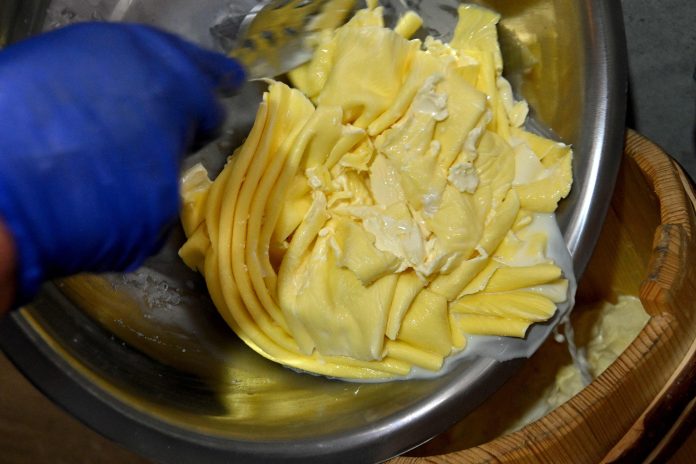Bosnian farmers preserve kajmak cheese aged in sheepskin sacks, now with national protected status and EU application pending.
GACKO: High in southern Bosnia’s mountain meadows, farmer Branka Buha combines modern technology with ancient cheese-making traditions.
While monitoring her cows via GPS, she continues ageing her kajmak cheese in traditional sheepskin sacks passed through generations.
“This tradition comes from my mother and mother-in-law, and now I’m passing it to my daughter-in-law,” said the 55-year-old farmer.
Her dairy operates in the hilly Domrke hamlet near Gacko at 1,200 metres elevation.
Buha’s eight cows roam mountain pastures freely during daylight hours, returning independently for evening milking.
After milking, she cooks the milk in large pots before transferring it to enamel bowls or wooden containers.
“We skim the milk skin that forms on the surface after one or two days, depending on temperature,” Buha explained while scooping the thick yellow layer.
The salted cheese rests in wooden barrels for approximately 20 days before being wrapped in animal hide.
“The longer it stays in the skin, the more it matures and acquires the specific flavour that makes it unique,” she noted.
Buha personally prepares the sheepskin bags by shaving, smoke-drying, and carefully washing the hides before stuffing them with cheese.
“It is an ancient preservation method from times without electricity or modern preservation means,” said Dragana Milovic, head of the Gacko Kajmak Producers Association.
The sheepskin-aged cheese develops stronger flavours with smoky and lamb notes compared to regular market varieties.
Buha and her husband produce 500-600 kilograms of kajmak annually, selling directly from their farm or to restaurants.
The cheese typically accompanies meat dishes, appears on toast with honey, or enhances traditional cornmeal dishes like cicvara.
In 2024, kajmak earned national Protected Designation of Origin status, increasing its price from 40 to 50 convertible marks per kilogram.
PDO status requires milk from cows grazing exclusively in the Gacko region and fed only local hay.
The producers association has applied for European Union PDO recognition, according to Milovic.
As an EU membership candidate, Bosnia-Herzegovina holds the right to protect its products within the bloc.
With limited production quantities, Milovic described the EU application as more about “prestige” than export revenue.







